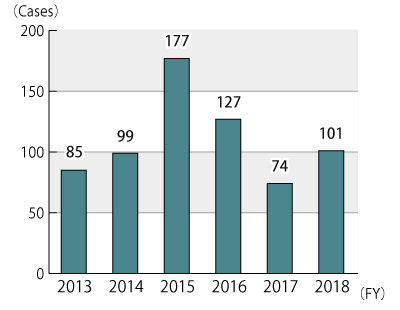Beware of contractual trouble over support services for the elderly such as guarantor service
As elderly single households are on the increase, there's growing use of support services for the elderly, such as guarantor service, daily living support, paperwork after death, etc. (hereinafter called "support services for the elderly"1).
On the other hand, local consumer affairs centers and the like across Japan have received numerous complaints and inquiries from consumers who got in trouble when signing or cancelling a contract for support services for the elderly (e.g. "I entered into an expensive contract without understanding contract details," "I'm dissatisfied with the amount of refund given after cancellation").
Diagram: Number of inquiries about support services for the elderly registered to PIO-NET2

The number of inquiries was 85 in FY2013, 99 in FY2014, 177 in FY2015, 127 in FY2016, 74 in FY2017, and 101 in FY2018.
- 1 "Support services for the elderly" discussed here are services for elderly people living alone, for instance, guarantor service, daily living support, paperwork after death, etc. Specifically, businesses offer guarantor service when getting hospitalized, moving into nursing home, or signing up for a rental house, daily living support such as shopping service and watching over service, funeral support service after death, etc. There may be both elderly and younger contract signatories for support services for the elderly.
- 2 PIO-NET is a database that collects information on inquiries concerning consumer affairs by linking NCAC with local consumer affairs centers and similar organizations across Japan via an online network. The above graph shows data registered through April 30, 2019, not including inquiries referred to NCAC from local consumer affairs centers.
Sample case
I was told to pay a deposit. I haven't received any detailed explanation yet.
I don't have any family or relatives I can rely on. Then I entered into a contract with a business offering guarantor service, paperwork after death, etc. The business told me to pay a deposit. I didn't fully understand contract details, so I hesitated to pay the expensive deposit in addition to contract money. The person in charge said, "Nobody knows what will happen to you tomorrow. Please pay the deposit as early as possible." I was bewildered by such an attitude. I haven't received any detailed explanation yet. What should I do?
(woman in her 60s)
Other typical inquiries and complaints
- I don't understand contract details. The contract is expensive, so I want to apply for cancellation.
- I signed up for an additional service after being induced to do so. The total price is higher than I expected.
- The contract covers more than I expected. I didn't intend to sign up for unnecessary services.
- The business didn't provide promised service, so I applied for cancellation. The business adjusted accounts without any explanation.
Problems highlighted by the inquiries and complaints
- Some consumers signed a contract without understanding service content or prices.
- Some consumers did not receive promised service.
- Some consumers got in trouble over a refund after cancellation.
Advice for consumers
- Properly convey what kind of service you want. Confirm contract details such as service content and prices.
- Before signing a contract, read terms and conditions: how a deposit will be used, how much refund will be given after cancellation, etc.
- Tell people around you what kind of contract you signed. The information will be helpful for them just in case.
- If you get in trouble when signing or cancelling a contract, consult your local consumer affairs center.
